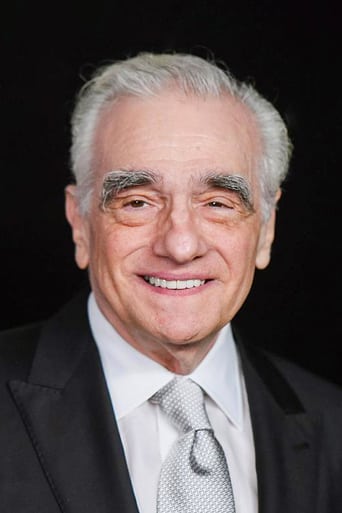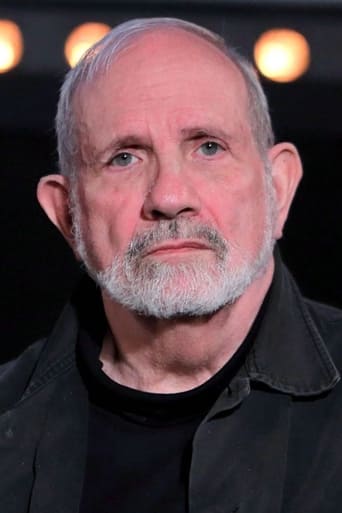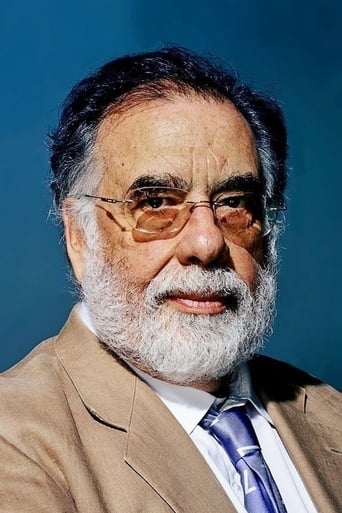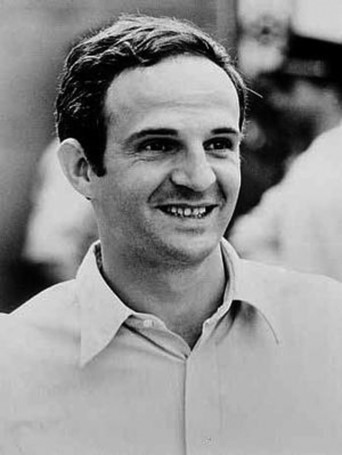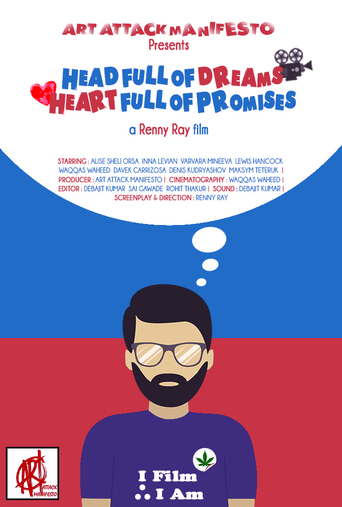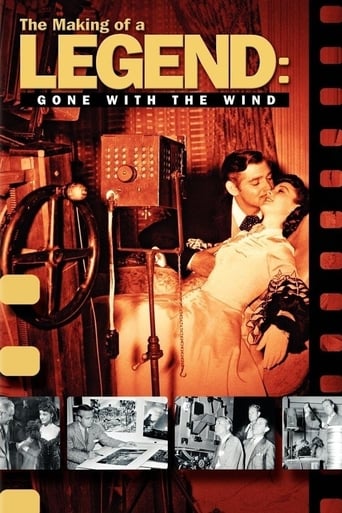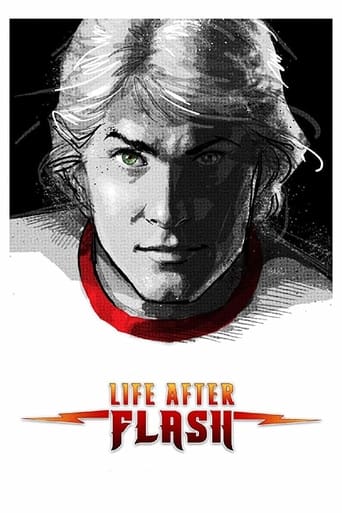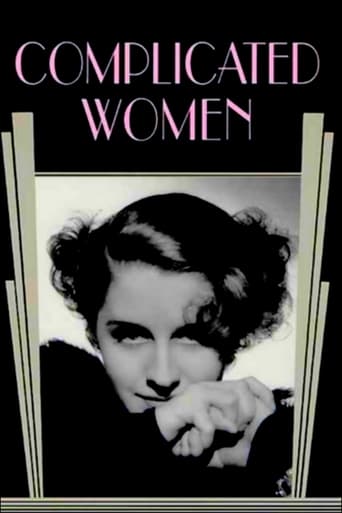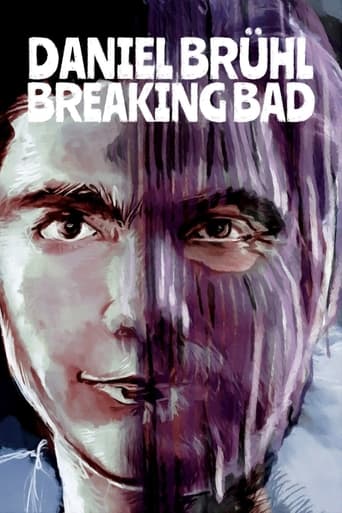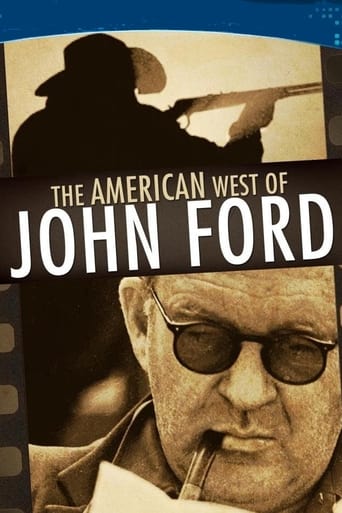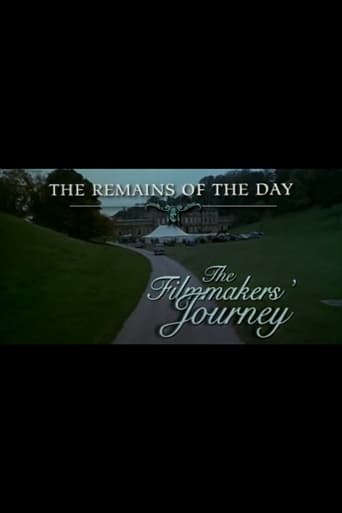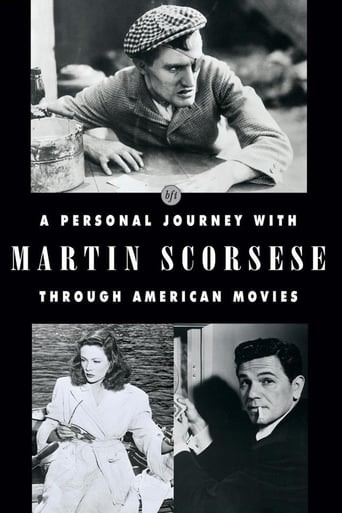
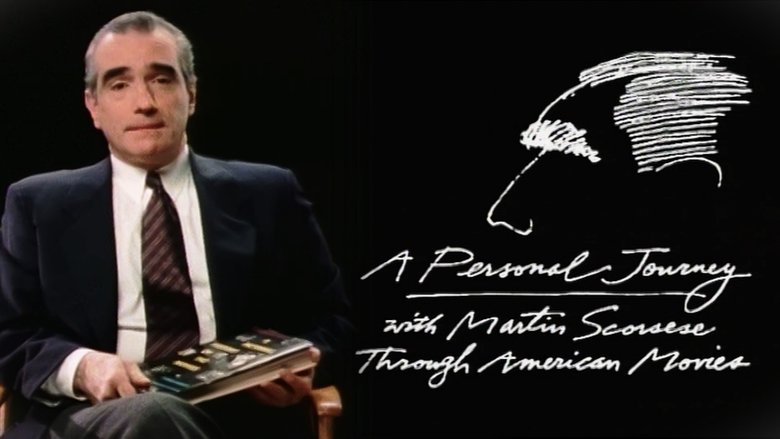
A Personal Journey with Martin Scorsese Through American Movies (1995)
Martin Scorsese celebrates American movies from the silent classics to the Hollywood of the seventies.
Watch Trailer
Cast


Similar titles
Reviews
Truly Dreadful Film
It's funny, it's tense, it features two great performances from two actors and the director expertly creates a web of odd tension where you actually don't know what is happening for the majority of the run time.
It's a feast for the eyes. But what really makes this dramedy work is the acting.
Watching it is like watching the spectacle of a class clown at their best: you laugh at their jokes, instigate their defiance, and "ooooh" when they get in trouble.
I was in danger of getting a neck cramp watching this movie, from all the nodding I was doing. Nodding in agreement with Scorsese's observations and especially his choice of films. It might have been called "A Personal Journey Through My DVD Collection" as he touched on many of my personal favorites, too many to start listing. His selection avoids many of the obvious milestones and leans towards the more obscure (although in the DVD era, most of them are widely available and now highly-regarded), especially when it comes to my beloved film noir. His passion is clear, his knowledge is thorough, and his comments are insightful. The documentary flows nicely, although occasionally he dwells on a certain clip or movie for too long. I can't say I learned a lot from this movie, but I did pick up a couple of new titles to check out, and it should be a fantastic intro for blossoming film buffs.
Prolific and highly influential filmmaker Martin Scorsese examines a selection of his favorite American films grouped according to three different types of directors: the director as an illusionist: D.W. Griffith or F. W. Murnau, who created new editing techniques among other changes that made the appearance of sound and color later step forward; the director as a smuggler: filmmakers such as Douglas Sirk, Samuel Fuller, and mostly Vincente Minnelli, directors who used to disguise rebellious messages in their films; and the director as iconoclast: those filmmakers attacking civil observations and social hang-ups like Orson Welles, Erich von Stroheim, Charles Chaplin, Nicholas Ray, Stanley Kubrick, and Arthur Penn.He shows us how the old studio system in Hollywood was, though oppressive, the way in which film directors found themselves progressing the medium because of how they were bound by political and financial limitations. During his clips from the movies he shows us, we not only discover films we've never seen before that pique our interest but we also are made to see what he sees. He evaluate his stylistic sensibilities along with the directors of the sequences themselves.The idea of a film canon has been reputed as snobbish, hence some movie fans and critics favor to just make "lists." However, canon merely denotes "the best" and supporters of film canon argue that it is a valuable activity to identify and experience a select compilation of the "best" films, a lot like a greatest hits tape, if just as a beginning direction for film students. All in all, one's experience has shown that all writing about film, including reviews, function to construct a film canon. Some film canons can definitely be elitist, but others can be "populist." As an example, the Internet Movie Database's Top 250 Movies list includes many films included on several "elitist" film canons but also features recent Hollywood blockbusters at which many film "elitists" scoff, like The Dark Knight, which presently mingles in the top ten amidst the first two Godfather films, Schindler's List and One Flew Over the Cuckoo's Nest, and the fluctuation of similar productions further down such as Iron Man, Sin City, Die Hard, The Terminator and Kill Bill: Vol. 2. Writer Scorsese's Taxi Driver Paul Schrader has straightforwardly referred to his canon as "elitist" and contends that this is positive.Scorsese is never particularly vocal at all about his social and political ideologies, but when we see this intense and admittedly obsessive history lesson on the birth and growth of American cinema in both ideological realms, we see that there is really no particular virtue in either elitism or populism. Elitism concentrates all attention, recognition and thus power on those deemed outstanding. That discrimination could easily lead to self-indulgence much in the vein of the condescending work of Jean-Luc Godard or the overrationalization of the production practices of a filmmaker like Michael Haneke. Yet populism invokes a belief of representative freedom as being only the assertion of the people's will. As has been previously asserted about the all-encompassing misconceptions the people have about cinema, populism could be the end of the potential power and impact of cinema. One can only continue seeing films, because it is a vital social and metaphysical practice. And that's what Martin Scorsese spends nearly four hours here trying to tell us, something which can't be told without being seen first-hand.
When the British Film Institute asked Martin Scorcese to create the American part of its Century of the Cinema series, he grabbed the opportunity with both hands. A Personal Journey through American Movies is a fascinating, wide-ranging and, as the title says, a highly personal look at Hollywood cinema.Scorcese's story is primarily about Hollywood's directors actors, producers, screenwriters and other collaborators barely get a mention. He states right from the beginning that for him the primary conflict within the film industry is that between the director's vision and the distributor's profit motive, between art and commercial viability. He even opens with a clip from Vincente Minnelli's The Bad and the Beautiful, one of the earliest films to openly explore this contradiction. This dictates the structure for the documentary. Scorcese looks at how genres have darkened and clichés have become challenged, how mavericks have challenged the production code, and how certain filmmakers fell from grace when they dared to be different. However, Scorcese never falls into the auteurist trap of dismissing directors who consistently pleased the studio bosses (he lavishes praise on Cecil B. De Mille), or those who had less of a recognisable style but were master craftsmen of the cinema nonetheless.Scorcese doesn't necessarily focus on his absolute favourite directors either (Orson Welles and Alfred Hitchcock, two of Scorcese's biggest influences, are only mentioned in passing). Instead, he looks at the individuals and the films that serve to tell his story. For example, he shows us a succession of John Ford films to show how the western evolved. He looks at the work of Vincente Minnelli (probably the most often referenced director of the documentary) to show how a supposedly wholesome genre like the musical could also have darker undercurrents. I can imagine that, had this assignment not been limited to America, Scorcese would have also loved to talk about, for example his Italian influences or his British hero Michael Powell. As it is, he stretches the definition of American movies to include both the Hollywood films of immigrant directors such as FW Murnau, Billy Wilder and Douglas Sirk, as well as the work of US-born filmmakers that was produced elsewhere such as that of Stanley Kubrick.Rather than simply tell the story of Hollywood chronologically, Scorcese compares films from various eras in order to tackle various subjects. In his section on the language and tools of cinema, he begins with DW Griffith, looks at the coming of sound, colour and widescreen and inevitably ends up going over computer generated effects which, although Scorcese is not keen on them, he is even-handed enough to include clips of George Lucas and Francis Ford Coppola defending them. However, he doesn't simply finish the chapter here as if this is the end of it. Instead, he then rewinds back to the 1940s, to show how a low-budget horror like The Cat People can achieve effective results from the simplest and cheapest of elements.A Personal Journey through American Movies has to be one of the best film documentaries made. There were a number of outstanding directors and pictures which I would never have discovered without, and even the most seasoned of film buffs would be likely to find something new in its broad scope. Scorcese has also restored the balance to forgotten or undervalued pictures. I was pleased to see that, when he talks about Kubrick in his "Iconoclasts" chapter, he looks at Lolita and Barry Lindon, for me his two most underrated films. Scorcese's respect for the medium is on display in the way he allows clips to play out fully, rather than just giving us tiny bits, and he interrupts them with talking heads (a combination of archive and new interviews) only when necessary. There is a bit of bias towards the 40s and 50s, but that is hardly surprising since it is the era in which Scorcese grew up and discovered cinema. And after all, I don't think this documentary could have been achieved had it not been a personal journey.One word of warning though, in its in depth look at certain pictures, this documentary does contain a fair few spoilers.
There's a mystical air you get when Martin Scorsese's talking about movies, his passion, especially if it's a shared passion with the viewer. The second his mouth opens you start to slowly realize, he knows what he's talking about. What a tremendous opportunity to listen to such a brilliant director discuss his inspirations. It was especially magical to watch over and over this three part documentary set for that reason. It's a wonderful gift to be able to find out what your inspiration is inspired by. I especially enjoyed listening to Scorsese directly credit films that effected the way he made some of his films. HIGHLY recommended to any movie buff with the balls to learn something new from a fantastic teacher.


